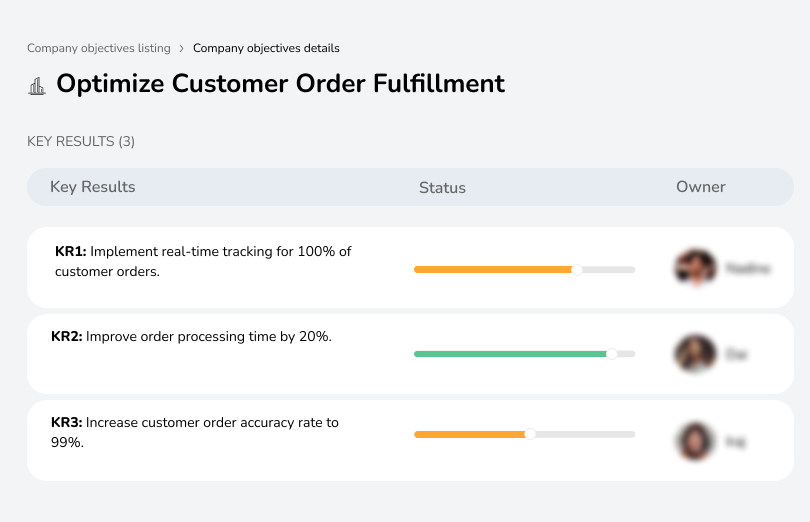Free OKR Templates
Download templatesThe COO in healthcare manufacturing is responsible for managing the company’s day-to-day operations, ensuring efficiency, quality, and compliance across all manufacturing processes. They focus on optimising production workflows, resource management, and implementing strategies that meet customer demands while upholding safety and product quality standards.
This role involves coordinating with production, logistics, and quality assurance teams to streamline operations, reduce costs, and ensure timely delivery. The COO ensures that all facilities run smoothly, regulatory requirements are met, and production goals are achieved without compromising quality.
In healthcare manufacturing, the COO is critical in driving operational excellence, maintaining consistent product quality, and ensuring that manufacturing processes are safe, compliant, and efficient to support the company’s growth and customer satisfaction.
15 OKR Templates for COO (Healthcare Manufacturing)
1. Challenge: Inefficient workflows lead to delays and increased costs
Objective: Streamline Operations for Improved Efficiency
Owned by: COO
Due date: 6 months
- KR1: Reduce production cycle times by 20% through process optimization.
- KR2: Decrease operational costs by 10% by implementing lean manufacturing techniques.
- KR3: Achieve a 95% on-time delivery rate for all customer orders.
2. Challenge: Silos between departments hinder smooth operations
Objective: Enhance Cross-Functional Collaboration
Owned by: COO
Due date: 5 months
- KR1: Conduct bi-monthly strategy alignment meetings with all department heads.
- KR2: Implement a company-wide project management tool to improve transparency and coordination.
- KR3: Increase cross-functional project success rate by 25%.
3. Challenge: Current capacity struggles to meet market requirements
Objective: Boost Production Capacity to Meet Growing Demand
Owned by: COO
Due date: 6 months
- KR1: Expand production capacity by 15% through equipment upgrades.
- KR2: Hire and onboard 50 new production staff within 3 months.
- KR3: Increase output per shift by 10% through optimized scheduling.
4. Challenge: Supply chain disruptions cause production delays
Objective: Improve Supplier Management and Procurement Efficiency
Owned by: COO
Due date: 4 months
- KR1: Establish long-term contracts with 80% of critical suppliers.
- KR2: Implement an inventory management system to maintain optimal stock levels.
- KR3: By diversifying the supplier base, material lead times can be reduced by 15%.

5. Challenge: Adapting to stringent healthcare regulations across multiple geographies
Objective: Ensure Regulatory Compliance Across Operations
Owned by: COO
Due date: 5 months
- KR1: Audit 100% of production facilities for compliance within 3 months.
- KR2: Implement corrective actions for all compliance issues within 2 months of identification.
- KR3: Achieve zero compliance-related production stoppages.

6. Challenge: There is an increasing need to adopt environmentally friendly practices
Objective: Drive Sustainability Initiatives in Operations
Owned by: COO
Due date: 6 months
- KR1: Reduce energy consumption across facilities by 15%.
- KR2: Achieve a 20% reduction in waste through recycling and reuse programs.
- KR3: Introduce three sustainable practices in manufacturing processes.

VP of Products (Manufacturing) Templates: Click here
7. Challenge: Delayed order fulfillment affects customer satisfaction
Objective: Optimize Customer Order Fulfillment
Owned by: COO
Due date: 4 months
- KR1: Implement real-time tracking for 100% of customer orders.
- KR2: Improve order processing time by 20%.
- KR3: Increase customer order accuracy rate to 99%.
8. Challenge: Lack of focus on ongoing process enhancements
Objective: Foster a Culture of Continuous Improvement
Owned by: COO
Due date: 5 months
- KR1: Launch a continuous improvement program in 100% of operational units.
- KR2: Train 80% of staff in Six Sigma or similar methodologies.
- KR3: Identify and implement 15 process improvements within 6 months.
9. Challenge: Operations are vulnerable to unexpected disruptions
Objective: Strengthen Crisis Preparedness in Operations
Owned by: COO
Due date: 4 months
- KR1: Develop contingency plans for 100% of critical operational processes.
- KR2: Conduct quarterly emergency drills at all facilities.
- KR3: Reduce operational downtime due to disruptions by 25%.

10. Challenge: Legacy systems limit scalability and agility
Objective: Advance Digital Transformation in Operations
Owned by: COO
Due date: 6 months
- KR1: Automate 70% of manual processes in operations.
- KR2: Upgrade IT infrastructure in 100% of facilities within 4 months.
- KR3: Train 100% of operational staff on new digital tools.

11. Challenge: High turnover and low engagement among production staff
Objective: Improve Workforce Productivity and Retention
Owned by: COO
Due date: 5 months
- KR1: Increase employee engagement scores by 20%.
- KR2: Implement a rewards program for high-performing teams.
- KR3: Reduce workforce turnover by 15% through improved work conditions and benefits.

12. Challenge: Equipment failures lead to unplanned downtime
Objective: Reduce Downtime in Manufacturing Processes
Owned by: COO
Due date: 4 months
- KR1: Conduct preventive maintenance for 100% of critical equipment.
- KR2: Reduce unplanned downtime by 20%.
- KR3: Implement predictive analytics for equipment monitoring.







